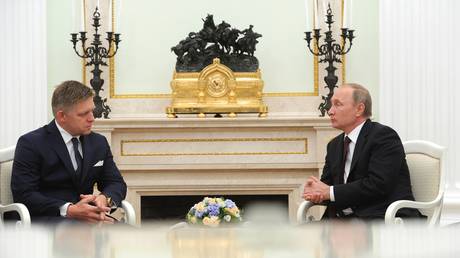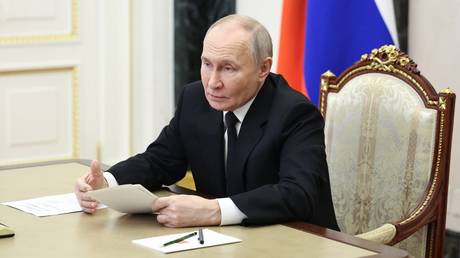Donald Trump picked Sen. Marco Rubio as his Secretary of State.
AP Photo/Evan Vucci, File
Donald Trump’s cabinet choices suggest a skeptical direction of travel on Ukraine policy.Many criticize the expense of US support for Ukraine, and some have directly insulted Kyiv.Any decision would still rest with Trump, who could yet choose a more measured path.
President-elect Donald Trump has made bold claims that he can bring the invasion of Ukraine to a swift conclusion.
Though he hasn’t said how he would do that, his choices in recent days for crucial cabinet roles will color his approach.
Across roles like Secretary of State, national security advisor, and Secretary of Defense, Trump has favored figures broadly less sympathetic to Ukraine than their forebears.
Their comments often focused on the financial burden of helping Ukraine — and the sense that the war has gone on too long.
America out of patience
Marco Rubio, who Trump appointed Secretary of State on Wednesday, praised Ukrainian forces for their efforts in fighting off Russia in the early days of the war.
But in an interview with NBC News in September, the Florida senator said the US had misstepped.
President Joe Biden’s administration, he said, was funding a “stalemate” war that needed to end.
That aligns with Trump’s repeated assertion that he would end the war quickly, even within a day of taking office.
Ukrainian officials tend to see that scenario as a losing one, where the conflict is frozen and Russia keeps the land it took.
President Vladimir Putin, they argue, would simply bide his time and attack again later.
Burning money?
Trump’s pick to lead the Pentagon, the Fox News anchor Pete Hegseth, has argued a skeptical position.
In an episode of the “Shawn Ryan Show” podcast last week, he described Ukraine as a comparable policy failure to the wars in Afghanistan and Iraq.
The US “burned two decades of money” in those countries, he said, and was “tempted to do it again” in Ukraine.
In the same interview, he questioned one of the main arguments for helping Ukraine — that if Russia is allowed to win there, it will keep going.
He dismissed that point and said Putin would probably stop at or near the Polish border. His implication appeared to be that a Ukrainian defeat would not, after all, be as bad as some feared.
A house is in flames after a Russian missile hit it in Kramatorsk, Donetsk Region, on November 11, 2024.
Alfons Cabrera/NurPhoto via Getty Images
Trump’s prospective national security advisor, Rep. Mike Waltz, has also argued the US is overcommitted.
In a 2023 op-ed for Fox News, he said that the US aid in Ukraine should be contingent on Europe doing more.
(European nations have collectively given more aid to Ukraine, but the US remains its single largest donor.)
On the other hand, he has floated pro-Ukraine policies, including allowing it to strike a broader array of Russian targets with US weaponry, a step Biden has resisted.
Tulsi Gabbard, nominated as Director of National Intelligence, has taken by far the hardest line on Ukraine, in a 2023 video characterizing Ukraine as a “corrupt autocracy” undeserving of support.
‘Losing your allowance’
The comments suggest that Trump would find little opposition if he moved to cut US aid to Ukraine.
Ukraine’s president, Volodymyr Zelenskyy, has said that US aid being cut would lead to Ukraine losing the war.
Trump’s son, Don Jr. — an influential figure albeit with no official role — seemed to relish the idea of Ukraine losing its funding.
In an Instagram story posted after the election, he captioned an image of Zelenskyy with “POV: You’re 38 days from losing your allowance.”
The Biden administration seems to be taking that possibility seriously, moving since the election to rush aid to Ukraine while it still can.
Trump’s call
It remains to be seen how influential any of Trump’s picks would be in shaping policy. Trump could take their advice or leave it.
Alexander Libman, a professor of Russian and East European politics at the Free University of Berlin, said that “Trump is selecting members of his administration primarily based on their personal loyalty.”
This means that their own opinions “may not matter that much — it will be up to what Trump wants them to do,” he said.
Some analysts have predicted a more measured approach that builds on Biden’s.
Mark Cancian, a commentator and retired Marine Corps colonel, said that a more skeptical administration could pull back on some types of support while keeping up others.
For example, it could continue to send weapons but cut non-military support for Ukraine’s economy.
Tymofiy Mylovanov, president of the Kyiv School of Economics, wrote in an essay for The Economist that Trump may end up committed to Ukraine to avoid being blamed for losing the war.
“He cannot afford for Ukraine to become his Afghanistan,” Mylovanov wrote.





+ There are no comments
Add yours